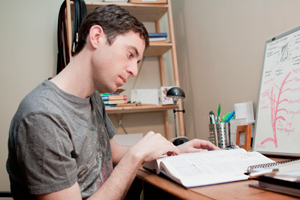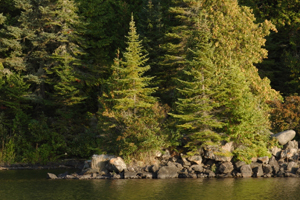

Unforgettable Homecoming
Indian Health Services Fellowship Reunites Einstein Med Student with His Tribe
Einstein offers its medical students a lot of opportunities for exploration. Each year, about 75 students receive global health fellowships, with approximately 10 percent choosing to remain stateside to take part in an Indian Health Service (IHS) fellowship program, administered through the U.S. Department of Health and Human Services. For 12 years, fourth-year students have enhanced their medical education by spending one or two months working at community hospitals that serve our nation’s reservation population.
While Einstein participants typically choose between assignments in New Mexico or Montana, for Michael Cecchini, the opportunity to do an IHS fellowship represented an unforgettable homecoming treating members of the Ojibwe in the upper peninsula of Michigan. A Native American group federally recognized as the Sault Ste. Marie Tribe of Chippewa Indians, the Ojibwe are a tribe he calls family.

Fourth-year student Michael Cecchini"It was a really cool experience," he said. "I felt like a different person afterwards; very fulfilled."
Although Mr. Cecchini didn’t grow up on the reservation, the trip was one he had looked forward to since arriving at Einstein.
"I had been to the reservation five years ago when I organized a health fair with my cousin, but the Indian Health Services fellowship allowed me to understand things from a completely different perspective," he explained. "I ended up learning a lot about myself and where I came from."
While his spiritual home will always be with his tribe in Michigan, Mr. Cecchini grew up in Northern California, where, as a high school student, he first became curious about medicine while visiting his grandmother at the hospital. His mom, a nurse, helped him satisfy his thirst for knowledge, directing him to a series of lectures offered at the University of California at San Francisco (UCSF).
"The lectures were designed for the public," he said. "Doctors and nurses discussed fields of medicine in a way everyone could understand. That got me thinking about a career in medicine." What appealed to him the most was the idea of helping others and the ability to interact with patients.
However, even as he took the necessary pre-requisites as an undergraduate at University of California at Santa Cruz, he wasn’t certain he wanted to pursue a medical career until he began shadowing Dr. Joel Karliner, a cardiologist based at UCSF.
"I learned just how invested you can be in your patients’ lives," he said. "It was a real hands-on experience and I enjoyed working with them."
While applying to medical school, Mr. Cecchini volunteered in Guatemala and studied Spanish. Soon after returning, he learned he had been accepted into Einstein. "It’s been fantastic," he said of his medical school experience. "I’ve made amazing friends and I‘ve received excellent training from great teachers and mentors."
One such mentor has been Dr. Lawrence Cytryn, a hematologist who heightened his interest in internal medicine, a career where he can work with patients and apply critical thinking skills to his care.
"Dr. Cytryn’s ability to connect with patients has been inspiring to me," he said. "He would bring patients into class and you could tell how much they loved him. I want to have long-standing relationships with my patients. That’s the type of doctor I’d like to be."

Chippewa Harbor, in MichiganThe ability to give back is another factor that drew Mr. Cecchini to Einstein, a school known for its commitment to social medicine and social justice. This commitment is reflected in fellowships, like the IHS.
"By treating an underserved community such as Native Americans, students achieve a better understanding of the ways culture, politics and economics contribute to an unnecessary prevalence of poor health and disease," noted Dr. Albert Kuperman, who established Einstein’s global health fellowship program and, together with Dr. Lisa Rucker, determined that the IHS experience could be an important component of the opportunities offered through it.
While working at the reservation’s clinic, Mr. Cecchini treated patients with a multitude of ailments. Many were similar to those he’d seen in the Bronx; for example, diabetes was "unbelievably prevalent." Other commonly seen health concerns included smoking, alcoholism and mental health issues.
Even so, there were differences in the type of care offered, differences that Mr. Cecchini understood. "You have to be aware of the patients’ alternative beliefs," he explained. "There is a difference between traditional medicine and Westernized medicine. It’s cultural and you must listen to patients’ concerns to be able to offer solutions and provide appropriate care. Through the fellowship, I was able to offer the tangible medical care I wasn’t able to when we held the health fair."
And he was rewarded for his efforts. "One of my most satisfying experiences was when a patient hugged me," he said. "He was happy I had come back to help."
With graduation on the horizon, he hopes to return to the reservation to expand on his efforts. In the meantime, he is preparing for his residency.
As he does so, he relishes his experience in Michigan. "These types of fellowships offer a totally different view of rural medicine," he said. "It’s an experience unlike any you would have with a typical medical education or your everyday rotations. You see different models of care, different belief systems, and encounter new cultural experiences."
Posted on: Thursday, January 19, 2012

Tablet Blog